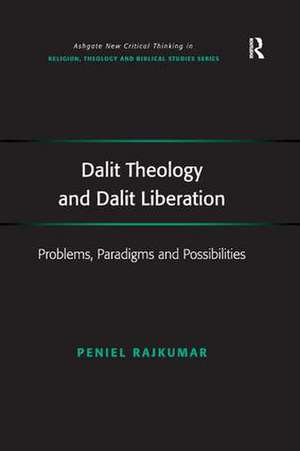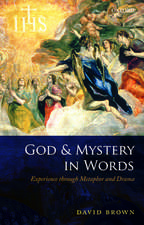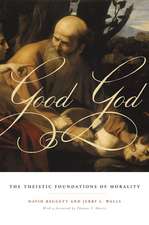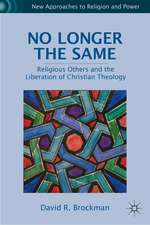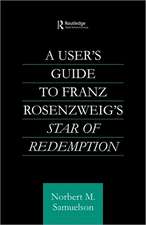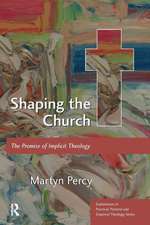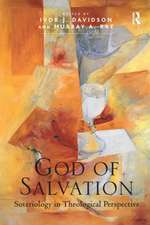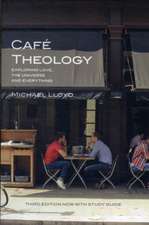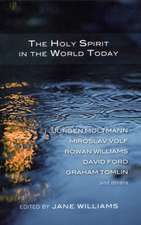Dalit Theology and Dalit Liberation: Problems, Paradigms and Possibilities: Routledge New Critical Thinking in Religion, Theology and Biblical Studies
Autor Peniel Rajkumaren Limba Engleză Hardback – 28 ian 2010
Din seria Routledge New Critical Thinking in Religion, Theology and Biblical Studies
-
 Preț: 295.00 lei
Preț: 295.00 lei -
 Preț: 310.22 lei
Preț: 310.22 lei -
 Preț: 326.73 lei
Preț: 326.73 lei -
 Preț: 311.41 lei
Preț: 311.41 lei -
 Preț: 302.06 lei
Preț: 302.06 lei -
 Preț: 313.38 lei
Preț: 313.38 lei -
 Preț: 310.80 lei
Preț: 310.80 lei -
 Preț: 293.81 lei
Preț: 293.81 lei -
 Preț: 326.55 lei
Preț: 326.55 lei -
 Preț: 309.23 lei
Preț: 309.23 lei -
 Preț: 311.59 lei
Preț: 311.59 lei -
 Preț: 324.89 lei
Preț: 324.89 lei -
 Preț: 340.66 lei
Preț: 340.66 lei -
 Preț: 311.03 lei
Preț: 311.03 lei -
 Preț: 311.41 lei
Preț: 311.41 lei -
 Preț: 401.91 lei
Preț: 401.91 lei - 28%
 Preț: 820.71 lei
Preț: 820.71 lei - 26%
 Preț: 764.69 lei
Preț: 764.69 lei - 18%
 Preț: 1059.45 lei
Preț: 1059.45 lei - 18%
 Preț: 1054.71 lei
Preț: 1054.71 lei - 18%
 Preț: 1054.71 lei
Preț: 1054.71 lei - 28%
 Preț: 823.34 lei
Preț: 823.34 lei - 18%
 Preț: 1054.71 lei
Preț: 1054.71 lei - 18%
 Preț: 1058.79 lei
Preț: 1058.79 lei - 18%
 Preț: 1054.71 lei
Preț: 1054.71 lei - 18%
 Preț: 1057.09 lei
Preț: 1057.09 lei - 18%
 Preț: 1055.51 lei
Preț: 1055.51 lei - 20%
 Preț: 191.60 lei
Preț: 191.60 lei - 18%
 Preț: 1056.28 lei
Preț: 1056.28 lei - 18%
 Preț: 700.75 lei
Preț: 700.75 lei - 18%
 Preț: 1054.71 lei
Preț: 1054.71 lei - 25%
 Preț: 767.07 lei
Preț: 767.07 lei - 26%
 Preț: 877.59 lei
Preț: 877.59 lei - 18%
 Preț: 1054.71 lei
Preț: 1054.71 lei - 18%
 Preț: 1057.89 lei
Preț: 1057.89 lei - 31%
 Preț: 765.40 lei
Preț: 765.40 lei - 18%
 Preț: 1054.71 lei
Preț: 1054.71 lei - 18%
 Preț: 1000.27 lei
Preț: 1000.27 lei - 30%
 Preț: 850.17 lei
Preț: 850.17 lei - 18%
 Preț: 1060.25 lei
Preț: 1060.25 lei - 18%
 Preț: 1059.45 lei
Preț: 1059.45 lei - 18%
 Preț: 1059.45 lei
Preț: 1059.45 lei - 18%
 Preț: 1000.27 lei
Preț: 1000.27 lei - 18%
 Preț: 1000.27 lei
Preț: 1000.27 lei - 18%
 Preț: 1054.71 lei
Preț: 1054.71 lei - 18%
 Preț: 1108.37 lei
Preț: 1108.37 lei - 26%
 Preț: 821.13 lei
Preț: 821.13 lei - 26%
 Preț: 820.32 lei
Preț: 820.32 lei - 18%
 Preț: 1054.71 lei
Preț: 1054.71 lei - 18%
 Preț: 1053.79 lei
Preț: 1053.79 lei
Preț: 1057.89 lei
Preț vechi: 1290.10 lei
-18% Nou
Puncte Express: 1587
Preț estimativ în valută:
202.42€ • 211.92$ • 167.49£
202.42€ • 211.92$ • 167.49£
Carte tipărită la comandă
Livrare economică 07-21 aprilie
Preluare comenzi: 021 569.72.76
Specificații
ISBN-13: 9780754665137
ISBN-10: 0754665135
Pagini: 218
Dimensiuni: 156 x 234 x 14 mm
Greutate: 0.54 kg
Ediția:1
Editura: Taylor & Francis
Colecția Routledge
Seria Routledge New Critical Thinking in Religion, Theology and Biblical Studies
Locul publicării:Oxford, United Kingdom
ISBN-10: 0754665135
Pagini: 218
Dimensiuni: 156 x 234 x 14 mm
Greutate: 0.54 kg
Ediția:1
Editura: Taylor & Francis
Colecția Routledge
Seria Routledge New Critical Thinking in Religion, Theology and Biblical Studies
Locul publicării:Oxford, United Kingdom
Recenzii
This is a wonderfully fresh, creative and intelligent contribution to Dalit Theology. There is wisdom on every page. Robin Gill, University of Kent, Canterbury Dr Peniel is an excellent guide through the complexities of the caste system and its enduring potency in the India of today. The central concern of Dalit theology is with the Dalit people, who used to be called Untouchables, and who are still a vast number of poor, despised and underprivileged people. This is an important, relevant, and disturbing book. It should be widely read, and responded to. Duncan B. Forrester, Edinburgh, UK Peniel Rufus’ incisive dismantling and insightful reconstruction of Dalit theology is a fresh and compelling contribution both to local and global theologies. Drawing creative synergy from his discontentment with Dalit Theology’s apathy toward everyday liberative praxis, Rufus brilliantly re-interprets the synoptic healing stories to engender committed and concrete emancipatory patterns for overcoming caste-based discrimination in India. This is a passionate, original, constructive and courageous book. No one interested in Indian theology can afford to bypass this remarkable book. Sathianathan Clarke, Wesley Theological Seminary, USA In many ways this is the book on Dalit theology that those of us working in the area of liberation hermeneutics have been waiting for. Liberation theology and liberation hermeneutics do not occupy the scholarly or activist space they used to, and so it is even more important at this moment in world history that those of us working in the area intensify efforts and collaborate with each other, serving both our own contexts and other sites of struggle. Peniel Rufus' books makes a significant contribution, interrogating as it does the interface between Dalit theology and the praxis of the Indian (largely Dalit) church. Here in South Africa we have witnessed a similar failure in the 'practical efficacy' of liberation theologies. We have m
Notă biografică
Peniel Rajkumar, an Anglican Priest, is a lecturer in Christian Social Ethics at The United Theological College, Bangalore, India. Prior to coming to India he served as an Assistant Curate at St.John the Evangelist Church, Upper Holloway in the Diocese of London and was involved in part-time lecturing at the University of Kent at Canterbury.
Cuprins
Introduction; Chapter 1 Answering Some Questions – The Why, What and How of Dalit Theology; Chapter 2 Questioning Some Answers – Critical Analysis of Dalit Theology; Chapter 3 The Way Forward; Chapter 4 A Christian Ethical Framework of Action; Part 2 Reading for Liberation; Chapter 5 Revisiting Dalit Christology; Chapter 6 Rethinking Agency, Re-signifying Resistance; Chapter 7 Re-configuring Dalit Praxis – Re-imagining the Other; Chapter 101 Conclusion;
Descriere
In fulfilling the long-awaited need for a constructive and critical rethinking of Dalit theology this book offers and explores the synoptic healing stories as a relevant biblical paradigm for Dalit theology in order to help redress the lacuna between Dalit theology and the social practice of the Indian Church. Peniel Rajkumar's starting point is that the growing influence of Dalit theology in academic circles is incompatible with the praxis of the Indian Church which continues to be passive in its attitude towards the oppression of the Dalits both within and outside the Church. The theological reasons for this lacuna between Dalit theology and the Church's praxis, Rajkumar suggests, lie in the content of Dalit theology, especially the biblical paradigms explored, which do not offer adequate scope for engagement in praxis.
